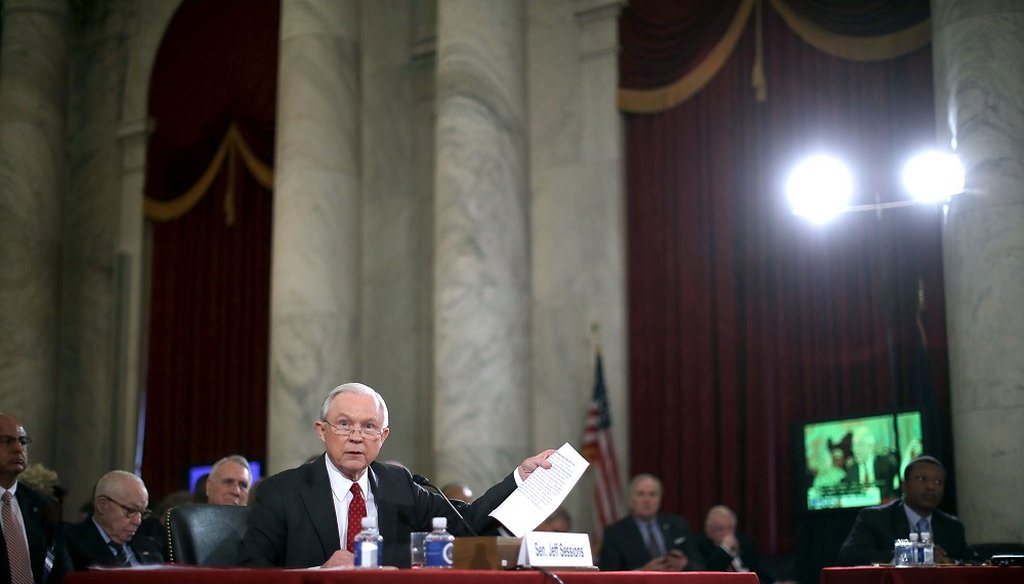Stand up for the facts!
Our only agenda is to publish the truth so you can be an informed participant in democracy.
We need your help.
I would like to contribute

Sen. Jeff Sessions (R-AL) testifies before the Senate Judiciary Committee during his confirmation hearing to be the U.S. Attorney General January 10, 2017 in Washington, DC. (Photo by Chip Somodevilla/Getty Images)
Sen. Jeff Sessions, Donald Trump’s pick for attorney general, went before Senate colleagues for the first confirmation hearing of the incoming administration.
With protesters interrupting throughout, Sessions denied accusations that he harbored racist views or had sympathy for the KKK.
"I abhor the Klan and what it represents and its hateful ideology," he said in his opening remarks.
Sessions, an Alabama Republican known for his anti-immigration views, was one of Trump’s earliest congressional backers. His nomination for attorney general has earned criticism from thousands of lawyers and law professors as well as prominent civil rights groups like the NAACP. Democrats say his 1986 bid for a federal judgeship failed partly because of racial insensitivity, while Republicans have characterized objections to Sessions as a "liberal smear campaign."
The Senate Judiciary Committee on Jan. 10, 2017, grilled Sessions over his civil rights record and his positions on gay rights and abortion, and how he’d handle the president-elect’s ideas during the campaign to prosecute Hillary Clinton, ban Muslims from entering the United States and reinstitute waterboarding.
Here are the biggest moments of the first day of Sessions’ hearing, fact-checked and with context.
How many desegregation cases did Sessions file?
In a tense exchange with Sen. Al Franken, D-Minn., Sessions admitted to embellishing his record on integrating schools and public organizations as a U.S. attorney in Southern Alabama from 1981 to 1993.
Franken referred to a 2009 National Review article in which Sessions said he "filed 20 or 30 civil rights cases" to desegregate schools, political organizations and county commissions as the U.S. attorney. Sessions later made a contradictory statement saying he had filed "a number" of those cases. Franken asked Sessions just how many cases did he bring.
"The records don't show that there were 20 or 30 actually filed cases," Sessions replied. "We had cases going throughout my district. And some of them were started before I came and came after I left. Some of them were brought and then settled promptly."
We asked Sessions’ office, the Trump transition team and the U.S. district court of southern Alabama for an exact number of civil rights cases filed by Sessions. But none of them got back to us in time for publication.
Our own search using the PACER database did not turn up any cases, though a spokesperson for PACER told us the online database may not have digital records covering Sessions’ time as U.S. attorney more than two decades ago.
An investigation by The Atlantic’s Adam Serwer produced a similar result: zero desegregation cases.
"Former Justice Department officials and civil-rights experts expressed puzzlement when asked about the claim, in part because nearly every school in Alabama was under desegregation orders by the 1970s, years before Sessions became U.S. attorney," Serwer wrote. "Several historians and legal experts who focus on desegregation said they were also unaware of any new school desegregation cases in Alabama filed during that period, let alone by Sessions."
ProPublica, which tracks desegregation nationwide, found just four new desegregation orders imposed by the Justice Department from 1981 to 1993, but none in Alabama.
In his questionnaire to the Senate Judiciary Committee, Sessions named one desegregation case (as well as three other civil rights cases) as among the "10 most significant litigated matters which you personally handled."
But as our friends at the Washington Post Fact-Checker point out, Birdie Mae Davis v. School Board Commissioners of Mobile County was filed in 1963 — almost two decades before Sessions’ tenure began — and lasted until 1997.
While a major development in the case did happen in 1985, a co-counsel wrote in an op-ed that that Sessions did not provide him any guidance or assistance and didn't seem interested in the case.
Sessions’ view of immigrants in the military
Democratic Sen. Dick Durbin of Illinois pressed Sessions for his lack of support of immigration bills favoring immigrants in the country illegally.
As an example, Durbin told him, "You've objected to immigrants volunteering to serve in our armed forces, saying, 'In terms of who's going to be most likely to be a spy, somebody from Cullman, Ala., or somebody from Kenya?' "
We rated that claim Mostly True.
In a 2014 radio interview on the Lars Larson Show, Sessions discusses immigrants in the military and raises concerns about a man from Kenya serving in the military, after allegations of the man trying to extort a local family. Sessions does question who’s more likely to be a spy -- somebody from small-town Alabama or Kenya.
The radio conversation includes comments about a subset of immigrants, people in the country illegally, and not all immigrants. With military reductions on the table, Sessions said "the last thing we need" is to get rid of people who have served in the military and bring in "people who are illegally in the country."
Sessions doesn’t want a Muslim ban
Sessions came out in opposition to the Muslim ban floated by Trump during the 2016 election.
"I have no belief and do not support the idea that Muslims, as a religious group, should be denied admission to the United States," he said.
We named the Muslim ban one of Trump’s top 10 promises (and we will track it on our Trump-O-Meter), but noted that the President-elect has made several tweaks to the idea. Sessions said he supports Trump’s proposal of "extreme vetting" of people coming from countries that have a "history of terrorism."
‘Lock her up’
Sessions said he would recuse himself from an investigation of Clinton if Trump follows through on his promise to prosecute her, given his criticism of her on the stump for Trump.
Sheldon Whitehouse, D-R.I., asked Sessions whether he ever chanted "lock her up" during the campaign.
"No, I did not. I don't think," Sessions said. "I heard it in rallies and so forth, sometimes I think humorously done. But it was a matter that I -- have said a few things -- a special prosecutor, I favored that. I think that probably is one of the reasons I believe that I should not make any decision about any such case."
A brief YouTube clip posted after the hearing shows a "lock her up" chant breaking out during a Sessions campaign stop for Trump, but he stops talking, grins and does not join in.
Sessions on voting, abortion and gay rights
Sessions’ conservative positions have also made Democrats nervous, with several asking Sessions whether he plans to uphold the laws he doesn’t agree with.
Though he said he still believes Roe v. Wade, the landmark case legalizing abortion, is one of "worst closely erroneous Supreme Court decisions of all time," he would follow that law and the law legalizing same-sex marriage as attorney general.
Later on, Sessions called the Voting Rights Act of 1965 "intrusive" but said it has a "factual basis" and was "justified," noting that he did vote to reauthorize it in 2006.
His record on drug-sentencing laws
Durbin further questioned Sessions about his views of President Barack Obama’s efforts to reduce uneven drug-sentencing laws, particularly with crack cocaine offenses, which PolitiFact explored as part of our Obameter series.
Sessions, the story notes, co-sponsored the bipartisan Fair Sentencing Act of 2010, which would have eliminated guidelines that treated crack cocaine as worse than the powder form of the drug.
Prior to that law, crack cocaine the only drug that netted mandatory prison time for a first offense. It also took 100 times as much powder cocaine to get the same minimum sentence as the crack form. This disparity was known as the "100-to-1" ratio.
In a 2009 Senate speech, Sessions had said, "I will not favor alterations that massively undercut the sentencing we have in place, but I definitely believe that the current system is not fair and that we are not able to defend the sentences that are required to be imposed under the law today."
Instead of eliminating the 100-to-1 ratio for crack cocaine, the final version of the Fair Sentencing Act only reduced it to an 18-to-1 ratio — so the current punishment still is not equal to powder cocaine.
Durbin asked Sessions why Sessions did not support an appeal to the U.S. Sentencing Commission to make the law retroactive to 5,000 inmates serving the 100-to-1 sentences.
Sessions acknowledged he had not agreed with Durbin on retroactivity, but that it was up to the courts to decide which cases deserved retroactive sentencing changes. Further changes in sentencing law would be up to Congress.
"It's not the attorney general's decision about when and where a mandatory minimum is imposed and whether it can be retroactively be altered. So I will follow any law that you pass," he said.
Our Sources
See links for sources































